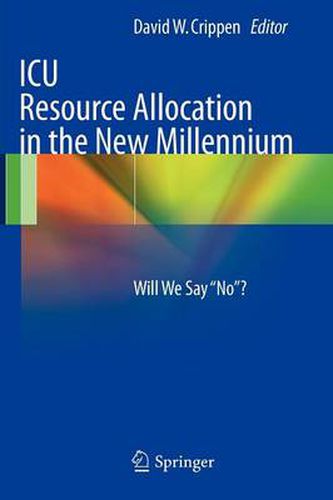Readings Newsletter
Become a Readings Member to make your shopping experience even easier.
Sign in or sign up for free!
You’re not far away from qualifying for FREE standard shipping within Australia
You’ve qualified for FREE standard shipping within Australia
The cart is loading…






This title is printed to order. This book may have been self-published. If so, we cannot guarantee the quality of the content. In the main most books will have gone through the editing process however some may not. We therefore suggest that you be aware of this before ordering this book. If in doubt check either the author or publisher’s details as we are unable to accept any returns unless they are faulty. Please contact us if you have any questions.
Intensive care medicine is one of the fastest growing services provided by hospitals and perhaps one of the most expensive. Yet in response to the global financial crisis of the last few years, healthcare funding is slowing or decreasing throughout the world.
How we manage health care resources in the intensive care unit (ICU) now and in a future that promises only greater cost constraints is the subject of this book, the third in an informal series of volumes providing a global perspective on difficult issues arising in the ICU.
Taking 12 developed countries as their focus, leading experts provide a country-by-country analysis of current ICU resource allocation. A second group of experts use the chapters as a departure point to analyze current ICU resource allocation at the level of the global medical village. The process is repeated, but with an eye toward the future - first country by country, then at the global level - that takes into account initiatives and reforms now underway.
A fictional healthcare plan, the Fair & Equitable Healthcare Plan, is put forth to address weaknesses in existing approaches, and healthcare experts and ethicists are invited to respond to its often provocative provisions.
Itself structured as a dialogue, the book is an excellent way to start or to continue serious discussion about the allocation of ICU healthcare resources now and in the years ahead.
$9.00 standard shipping within Australia
FREE standard shipping within Australia for orders over $100.00
Express & International shipping calculated at checkout
This title is printed to order. This book may have been self-published. If so, we cannot guarantee the quality of the content. In the main most books will have gone through the editing process however some may not. We therefore suggest that you be aware of this before ordering this book. If in doubt check either the author or publisher’s details as we are unable to accept any returns unless they are faulty. Please contact us if you have any questions.
Intensive care medicine is one of the fastest growing services provided by hospitals and perhaps one of the most expensive. Yet in response to the global financial crisis of the last few years, healthcare funding is slowing or decreasing throughout the world.
How we manage health care resources in the intensive care unit (ICU) now and in a future that promises only greater cost constraints is the subject of this book, the third in an informal series of volumes providing a global perspective on difficult issues arising in the ICU.
Taking 12 developed countries as their focus, leading experts provide a country-by-country analysis of current ICU resource allocation. A second group of experts use the chapters as a departure point to analyze current ICU resource allocation at the level of the global medical village. The process is repeated, but with an eye toward the future - first country by country, then at the global level - that takes into account initiatives and reforms now underway.
A fictional healthcare plan, the Fair & Equitable Healthcare Plan, is put forth to address weaknesses in existing approaches, and healthcare experts and ethicists are invited to respond to its often provocative provisions.
Itself structured as a dialogue, the book is an excellent way to start or to continue serious discussion about the allocation of ICU healthcare resources now and in the years ahead.